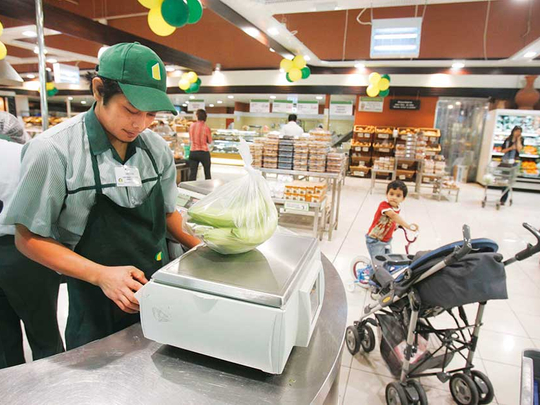
Dubai: The incoming chief executive of Spinneys UAE has said that he will look to expand the business both domestically and internationally, whilst attempting to crack the eCommerce grocery challenge.
Matthew Frost |
In an exclusive interview with Gulf News ahead of the start of his tenure as Spinneys’ Chief Executive Officer in January 2018, Matthew Frost offered a comprehensive assessment of the grocery market in the UAE, sharing his views on taxation, technology, and emerging trends.
On the subject of expansion, however, Frost did say that whilst he hadn’t yet gotten a “full view of the opening programme for Spinneys over the next three to four years,” he was aware of “three to four sites they’re looking at to expand the Waitrose brand, and probably slightly more from a Spinneys perspective”.
He added that he was excited to see how the emirate, and the wider UAE, would grow over the next two years in the build up to Dubai Expo 2020, specifically as it pertained to population movements and demographic splits.
“Where populations migrate or move to … We need to make sure we’re in those locations,” Frost said.
With new retail openings in the UK fairly stagnant, the senior executive, who is replacing the outgoing Jannie Holtzhausen, relishes the opportunity for expansion and growth.
This expansion is not simply limited to the UAE, either. “As we look for new opportunities to grow, I would expect our products to go outside the UAE as well,” Frost said, adding that he wasn’t sure of the timings around that expansion, but that it was something his new company should aspire to.
Waitrose UK, where Frost moves to the UAE from, is known for its aggressive international expansion, with branches in a number of countries around the world.
Picking the right geographies, however, would be the biggest challenge, Frost added.
“Do you go in to a market where retail is flourishing, or do you go for first mover advantage, be the first to market” and take the risks, he asked.
eCommerce platform
On the issue of new technology, Frost made no secret about his desire to find a way to bring eCommerce to the UAE’s grocery market.
This, he said, was hampered by the cost of bringing people fresh foods.
“One thing is for sure, there will be an eCommerce platform for delivering everyday fresh and ambient [groceries] … But I know it’s hugely costly expensive to set up. But this is increasingly how customers want to shop, especially for ambient,” Frost said.
Ambient food refers to goods that can be stored at room temperature in a sealed container.
Frost noted that there wasn’t as high a demand for fresh foods, however, as shoppers still liked to be able to see things such as fruit and vegetables before buying them.
“I think eCommerce is inevitable, it’s how you take it to market that is the challenge that I’m certainly keen to get my head around quite quickly,” Frost said.
He noted that disruptive players such as Souq were another big driver of this need to innovate.
Spinneys may choose to use a third party platform or invest in their own directly, he added.
According to the senior executive, eCommerce is a customer expectation, making it inevitable. “I’ve heard from many friends in Dubai who have told me ‘If you can crack eCommerce, you’ll have my business.’”
It is not just emerging technologies which Frost will need to get his head around, either.
Excise tax
With the UAE’s first tax set to come in to effect on Sunday, October 1, supermarkets and other retailers will see the price of carbonated sugary drinks rise by 50 per cent over night.
And then, around the same time that Frost is set to take over, the country will implement a far more widespread tax in the form of VAT, at a rate of 5 per cent. This is due to start on January 1, 2018.
Perhaps Frost does not have too much to worry about when it comes to VAT, however. According to Euromonitor Head of Research Nikola Kosutic, the grocery segment will be least affected as most of it will be exempted.
The incoming CEO agrees with this assessment, drawing on his experience in the UK, which as applies a VAT rate of 20 per cent to luxury items.
Essential goods, such a postage stamps and staple foods, are exempt in the UK, and there have been numerous challenges to the government’s position over the years, the most famous of which was over whether or not feminine hygiene products should be taxed under VAT.
Dialogue with authorities
Frost says he will not shy away from a strong dialogue with the government on such issues.
“I am somebody who will appropriately challenge the authorities if I feel it’s an important issue,” he said on the issue of VAT.
Overall, though, he believes that taxes are important for a diverse economy, and the tax on sugary drinks was important for battling diabetes and high-cholesterol.
“We have a job as a retailer to support some of the big concerns in society today,” Frost said, whilst warning that sugar in food was a “hugely emotional, political issue” and might perhaps be better solved with ongoing dialogue as opposed to taxation.
Aware of the rising demand for healthy foods and free-from products, such as free-from gluten or free-from antibiotics, Frost notes the changing role of the supermarket.
“I think our business, and our industry more generally, is at a cross roads ...,” Frost said, when asked what he would do differently to his predecessor. Acknowledging the need for healthier options to keep pace with the growing demand for health and wellness products in the retail sector, the executive concluded that supermarkets needed “to do more in our communities to educate people”.












